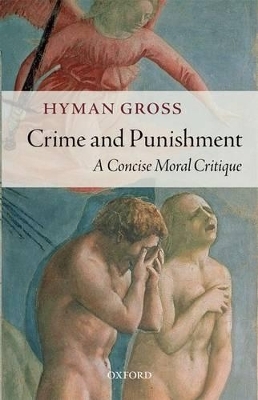
Crime and Punishment
A Concise Moral Critique
Seiten
2012
Oxford University Press (Verlag)
978-0-19-964471-1 (ISBN)
Oxford University Press (Verlag)
978-0-19-964471-1 (ISBN)
Presenting an engaging critique of current criminal justice practice in the UK and USA, this book introduces central questions of criminal law theory. It develops a forceful argument that the prevailing justifications for punishment are misguided, and have resulted in the systematic infliction of unnecessary human misery.
It is generally assumed that we are justified in punishing criminals because they have committed a morally wrongful act. Determining when criminal liability should be imposed calls for a moral assessment of the conduct in question, with criminal liability tracking as closely as possible the contours of morality. Versions of this view are frequently argued for in philosophical accounts of crime and punishment, and seem to be presumed by lawyers and policy makers working in the criminal justice system.
Challenging such assumptions, this book considers the dominant justifications of punishment and subjects them to a piercing moral critique. It argues that none overcome the objection that people who are convicted of a serious crime and sent to prison have their basic human rights violated. The institution of criminal punishment is shown to be a regrettable necessity not deserving of the moral enthusiasm it enjoys among many politicians and the popular press. From a moral point of view, punishment is entitled at best to grudging toleration.
In the course of developing the argument, the book introduces the principal issues of criminal law theory with the aim of presenting a morally enlightened perspective on crimes and why we punish them. Enforcement of the law by police, prosecutors, and courts is a matter of concern for political morality, and the principal practices of the criminal justice system are subjected to moral scrutiny. The book offers an engaging, provocative introduction to thinking about the philosophy of crime and punishment, challenging students and other readers to think about whether we are justified in punishing wrongdoers.
It is generally assumed that we are justified in punishing criminals because they have committed a morally wrongful act. Determining when criminal liability should be imposed calls for a moral assessment of the conduct in question, with criminal liability tracking as closely as possible the contours of morality. Versions of this view are frequently argued for in philosophical accounts of crime and punishment, and seem to be presumed by lawyers and policy makers working in the criminal justice system.
Challenging such assumptions, this book considers the dominant justifications of punishment and subjects them to a piercing moral critique. It argues that none overcome the objection that people who are convicted of a serious crime and sent to prison have their basic human rights violated. The institution of criminal punishment is shown to be a regrettable necessity not deserving of the moral enthusiasm it enjoys among many politicians and the popular press. From a moral point of view, punishment is entitled at best to grudging toleration.
In the course of developing the argument, the book introduces the principal issues of criminal law theory with the aim of presenting a morally enlightened perspective on crimes and why we punish them. Enforcement of the law by police, prosecutors, and courts is a matter of concern for political morality, and the principal practices of the criminal justice system are subjected to moral scrutiny. The book offers an engaging, provocative introduction to thinking about the philosophy of crime and punishment, challenging students and other readers to think about whether we are justified in punishing wrongdoers.
Hyman Gross is the sometime Arthur Goodhart Professor of Legal Science and a Fellow of Corpus Christi College, University of Cambridge.
Preface ; Introduction ; 1. Crime and Impunity ; 2. Sufficiently Good Reason ; 3. Taking Human Rights Seriously ; 4. Crimes as Pretexts for Improvement ; 5. Crimes as Demands for a Remedy ; 6. Punishment and Injustice ; 7. Crime, Harm, and Moral Wrong ; 8. Criminal Conduct and Its Culpability ; 9. More About Culpability ; 10. Psychoculpability ; 11. Persons and Choices ; 12. Consoling Fictions ; 13. Guilt and Convictability ; 14. The Decline of Punishment ; Postscript: Reconceiving Response to Crime ; Notes ; Some Further References
| Verlagsort | Oxford |
|---|---|
| Sprache | englisch |
| Maße | 148 x 221 mm |
| Gewicht | 511 g |
| Themenwelt | Geisteswissenschaften ► Philosophie ► Ethik |
| Recht / Steuern ► Allgemeines / Lexika | |
| Recht / Steuern ► EU / Internationales Recht | |
| Recht / Steuern ► Strafrecht ► Kriminologie | |
| Recht / Steuern ► Strafrecht ► Strafverfahrensrecht | |
| Sozialwissenschaften ► Politik / Verwaltung ► Politische Theorie | |
| ISBN-10 | 0-19-964471-3 / 0199644713 |
| ISBN-13 | 978-0-19-964471-1 / 9780199644711 |
| Zustand | Neuware |
| Haben Sie eine Frage zum Produkt? |
Mehr entdecken
aus dem Bereich
aus dem Bereich


